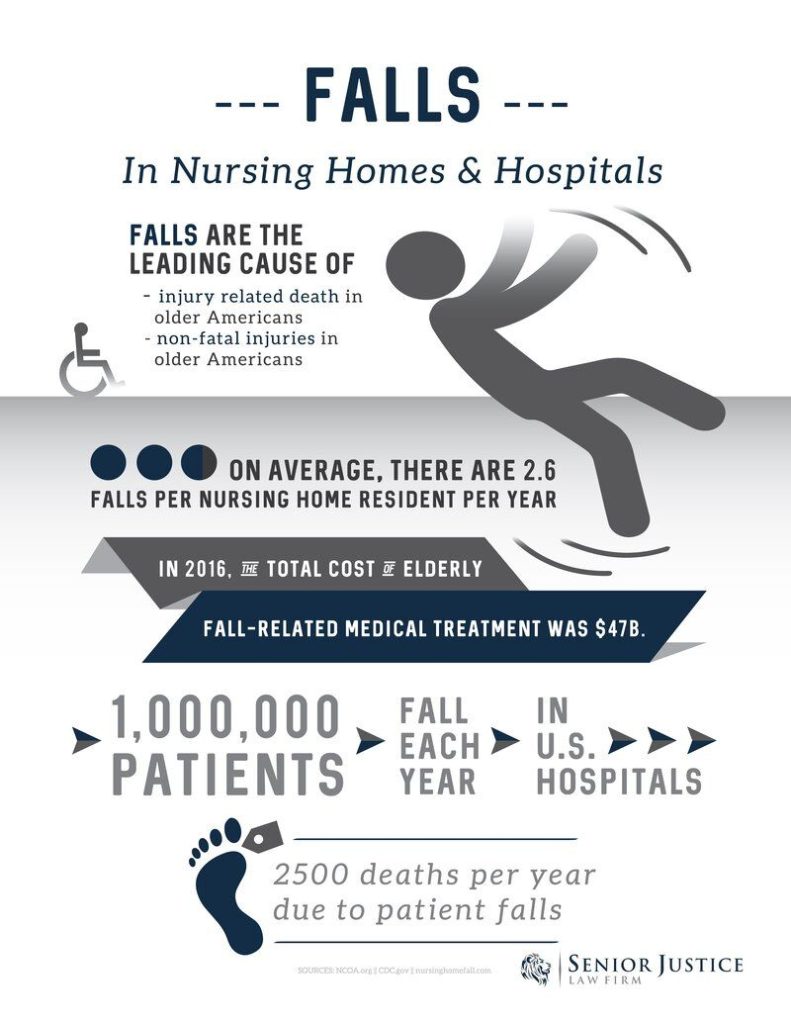Nursing Home Fall Lawyers Fighting for Victims of Preventable Falls
Is a nursing home liable for patient falls?
Quick Answer: Yes, federal and state law require nursing homes to implement reasonable fall precautions to prevent falls. Our nursing home fall attorneys frequently find that nursing homes breach this duty, which is a form of nursing home negligence. When a preventable fall occurs, the nursing home can be held liable for the damages. Speak with our nursing home fall attorneys today to learn more about assessing the preventability of a facility fall.
Free Nursing Home Fall Lawsuit Consultation
Nursing homes have a legal duty to stop residents from falling. Failing to stop preventable falls is a form of nursing home negligence, and the results can be deadly. Nursing homes can be held liable for failing to stop a resident from falling.
If your loved one suffered a fall in a nursing home or healthcare facility, speak with Senior Justice Law Firm today. Our firm focus is on elder abuse cases. About half of our caseload involves elderly fall lawsuits. Our nursing home fall attorneys have successfully handled thousands of cases. This is all that we do.
Let our compassionate and experienced law firm help your family on your journey to justice. Live chat with our office now, or call us 888-375-9998. The consultation is free and we only get paid if we win your case. Get answers now. Speak with one of our qualified nursing home fall attorneys today.
Frequently Asked Questions in Nursing Home Fall Lawsuits
If your loved one was injured as a result of a fall in a nursing home, you likely have dozens of questions. We are here to provide answers to your questions, and educate you on your legal rights. A life threatening fall is not an acceptable outcome of a nursing home residency.
Why do Elderly Nursing Home Patients Suffer Falls?
As people age, they tend to lose their coordination. They get forgetful, especially when residing outside of their home. Most patients also take psychotropic medication, and are usually cycling in an out of the hospital.
All these factors increase a patient’s fall risk. But while fall risk is expected, this does not mean that falling down should become a regular part of a nursing home residency. This is why the law allows families to hold nursing homes accountable when their loved one suffers a fall inside the facility.
Are Nursing Homes Legally Liable for Allowing a Resident to Fall?
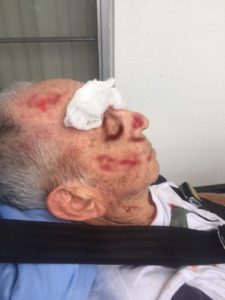
In many cases, yes. Nursing homes have a legal duty to implement fall preventative care plans to stop residents from falling. When a healthcare facility fails to use appropriate fall interventions and a patient falls and gets hurt, this is an example of nursing home negligence.
If someone you love, like your mother or father, lives in a nursing home and has recently had a fall, the facility may have tried to explain that falling down is simply a consequence of getting older. However, the state and federal regulations that govern nursing homes say the opposite. It is important to be aware—patient falls are not an acceptable or normal part of living in a nursing home. Each facility has a responsibility to enact fall prevention plans, especially for patients who are at risk, and failure to do so can mean that the nursing home is in violation of the law.
State and federal laws protect patients from falling inside facilities. Patient falls are not an acceptable outcome of any nursing home residency or hospitalization.
If a resident is a “fall risk”, the facility must utilize fall prevention planning to stop falls. Nursing homes and hospitals are legally required to use fall prevention measures.
Failing to prevent falls is a form of patient neglect and the results can be devastating.
If your loved one experienced a fall resulting in a fracture, brain bleed, wrongful death, or serious injury, have the matter investigated by one of the nursing home fall lawyers at Senior Justice Law Firm today.
Why Bring a Nursing Home Fall Lawsuit?
A fall is never a pleasant experience, but for nursing home residents, it can be particularly dangerous. From broken bones to brain bleeds and even untimely death, you count on nursing homes to protect the people you love from injury. When the facility does not prevent your parent or loved one from falling and being injured, or even passing away, they may be guilty of patient neglect. It is vital that you work with a an nursing home fall attorney to investigate as soon as possible after the event. Not only can you receive compensation and the justice that you deserve, but you can also hold the facility accountable and protect the lives and wellbeing of other residents who rely on the nursing home. Taking action against the facility could save lives, create change, and stop future falls.
At Senior Justice, we understand that nursing homes don’t always do the right thing. Reach out to tell us about what happened to your loved one. Our experienced nursing home fall attorneys are available at 888-375-9998 to help you learn more about your rights and options following a fall-related injury or death inside a facility.
Can I Bring a Lawsuit Against a Nursing Home for a Loved One Who Fell and Died?

Yes, you can if you are the surviving next of kin to the victim.
While it is true that some falls are genuinely accidental—almost everyone trips over their own feet from time to time— falls in elderly nursing home residents are different from garden variety slip and falls involving ordinary people. While most ordinary slip and falls are attributable to a person being clumsy, nursing home patients are known fall risks. They have underlying health issues and cognitive disorders. They cannot be responsible for their own wellbeing. This is why they are in the nursing home; to be kept safe.
For this reason, the law requires nursing home intervention to stop falls. Once our nursing home fall attorneys investigate, we find many falls within nursing homes are preventable. This is grounds for a nursing home fall lawsuit.
Are Nursing Home Falls and Hospital Falls Preventable?
Yes, most facility falls are preventable if appropriate fall preventative measures are used.
People may occasionally fall in what is truly an accident, such as taking too short a step. However, many times, falls are a result of a nursing home that did not 1) implement the proper protocols to prevent falls and/or 2) correctly identify residents who are at risk of falling.
Often, this lack of adequate fall prevention is the result of staffing issues, as nursing homes seek to maximize profit by hiring (and thus paying) as few staff members as possible. This leaves the facility short on hands and means that residents do not receive the consistent checking and care that would prevent them from feeling the need to walk and accomplish tasks on their own, without help.
Was my Mom’s or Dad’s Nursing Home Fall Preventable?
The preventability of a facility fall boils down to a number of factors, including:
- Was the patient deemed a fall risk?
- If so, what did the facility do to prevent falls?
- Did the patient suffer falls before this fall?
- If so, what did the facility do differently to prevent future falls? Did the care plan change after the other fall(s)?
- What fall prevention options does the facility use?
- Were these fall prevention methods working? Was there more the facility could have done to stop patient falls?
The preventability of a nursing home fall requires technical expert analysis. Contact Senior Justice Law Firm if you believe your parent may have suffered a preventable fall inside a healthcare facility. Our firm can help you get answers, including the preventability, or lack thereof, of the facility fall.
How are Falls Prevented in Nursing Homes and Hospitals?
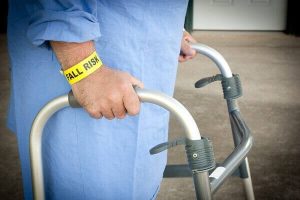
Falls are prevented in nursing homes by following a fall intervention care plan.
Each facility is legally required to do its due diligence to mitigate fall risk for each individual resident who lives there. This could mean setting up an alarm that sounds if a resident gets out of bed on their own, regularly checking on residents to ensure their needs are met, or placing fall pads around a bed to reduce the impact of a potentially hazardous fall—among many other options. These are not suggestions; they are requirements if a nursing home follows regulations on reducing the occurrence of falls.
Whether your mom, dad, or loved one lives at a nursing home, assisted living facility, or other healthcare facility, there are a variety of fall interventions available. One of the most common and effective is regular monitoring, in which staff members check on the resident every 15 to 30 minutes. This ensures that their needs are being met and drastically reduces the odds that they will get up to complete a task on their own, since they are often presented with opportunities for assistance.
A toileting schedule is also an easy, yet extremely effective fall prevention method. Most elderly patients try to get up in the middle of the night to use the restroom. This is a common cause of nursing home falls. If staff simply use a toileting schedule and help the resident use the restroom once just before bed, this usually alleviates the urgency in the middle of the night. A toileting schedule can be the difference between life and death in preventing an unassisted toileting fall inside a nursing home.
Another option that should be used in conjunction with more fall prevention measures is visual representation of at-risk residents. This is commonly done by placing a star sticker on the door of a room that contains a resident who has been documented as high risk for falls. This enables staff to provide personalized attention to reduce the danger.
Nursing homes have largely phased out of using bed rails, as they appear to have little to no positive impact on reducing falls and instead pose some danger, such as asphyxiation. However, other bed-centric measures have been shown to help, including the use of low beds. Keep the bed low to the floor provides more stable footing when a resident does stand, and it reduces the distance fallen if a resident does lose their balance, cutting down on potential injuries. A scooped mattress also keeps a patient in the bed and safe from falls.
Similarly, nursing homes should utilize floor mats to soften the blow if a resident does fall from bed. These mats are often anti-slip to aid in balance and grip.
Finally, nursing homes should use bed alarms, which are vital in keeping residents safe. These alarms are pressure pads placed under a mattress or a wheelchair seat. When the pressure is lessened (indicating that a patient is getting up unassisted), the alarm will sound, calling staff to the room before the patient can fall. One of the most common reasons that nursing homes are found to be negligent in cases of fall injuries is because staff ignored a bed alarm.
Is my Parent to Blame for Getting Up Without Assistance and Falling in the Nursing Home?
No, they are not. Dementia, disorientation, confusion, and medications generally make it impossible to educate an elderly nursing home resident to stay in bed.
It is understood that human beings will attempt to do activities that they feel are necessary (such as getting up to use the restroom). Also, as individuals age, they begin to experience cognitive effects that make it difficult for them to remember or understand that they need help walking. Nursing homes anticipate that residents will try to get up on their own, which is why they are required to implement fall prevention for at risk individuals.
A nursing home cannot blame your parent for falling in an attempt to alleviate their own liability. This would be like a daycare blaming a toddler for running in the street. The ultimate responsibility lies with the facility to supervise, assist, and monitor the patients they are being paid to protect.
How Can I Determine if a Nursing Home is Liable for My Mom’s Fall?
Assessing liability in a nursing home fall lawsuit involves analyzing the foreseeability of the fall.
If the fall was preventable, the family may bring a negligence lawsuit against the at-fault facility. If the fall was an unforeseeable and unpreventable event, there will not be a liability against the nursing home or hospital.
To make this determination, we will go over some common questions and answers that we regularly encounter with patient fall lawsuits versus hospitals and nursing homes.
Want to ask a specific facility fall question to our qualified nursing home fall lawyers? Call us now at 888-375-9998 for your free nursing home fall claim evaluation.
What Kind of Elderly Nursing Home Resident Suffers Fall-Related Injuries?
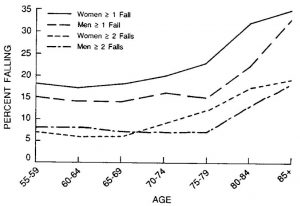
Statistically, female nursing home residents suffer more falls than their male counterparts.
In addition to suffering a higher quantity of falls, women are more likely to get injured in a nursing home fall. Female nursing home residents are two times more likely to suffer serious injury and wrongful death from patient falls, compared to men.
This is likely due to female residents living longer than men, and suffering from higher rates of osteoporosis. With brittle bones and osteoporosis, elderly falls are more likely to be fatal.
What Factors Make my Mom or Dad a Fall Risk?
Unsteady gait, poor balance, confusion, dementia, poor vision, prescription drug usage, and recent surgery all increase a patient’s fall risk. Prior falls also increase a resident’s fall risk.
Is It Worth Bringing a Nursing Home Fall Lawsuit?
Yes. Nursing home fall lawsuits serve two purposes; to get your family monetary compensation, and to create change inside the facility.
A nursing home fall lawsuit can sound a lot more complicated than it really is, especially if you work with attorneys who focus on neglect in nursing homes and are familiar with the field. Determining whether a fall was preventable requires an expert to look at the specific case, as well as the risk factors associated with falls. Not a whole lot is required from you, as the victim’s survivor. Further, the overwhelming majority of these nursing home fall cases settle before trial. So, it is highly unlikely your case would go to trial, unless you wanted it to.
Your claim can have a powerful positive effect on future patient care. Not only could you claim monetary damages for the suffering that your loved one endured, but you could also penalize the nursing home and incentivize them to change their practices. This is a major victory for all the residents who rely on that nursing home for their care. Your lawsuit could save lives and create new policies in the offending facility.
Damage-wise, you may be able to receive compensation depending on the details of the case. The most common damages we see in facility fall lawsuits are:
- Broken bones, like hip fractures and femur fractures
- Subdural hematomas and brain bleeding
- Wrongful death (fall, blunt force trauma, or accident listed on the death certificate)
Statistics indicate that only 1 in 5 incidents of elder abuse get reported. By taking legal action, you are holding the facility accountable and being the voice of other residents who may not be able to speak out for themselves.
At Senior Justice Law Firm, we understand that your attention right now is turned to your family, your finances, and your wellbeing. That is why our consultations are free of charge, and we will only receive payment out of any compensation that we secure for you. You will not have to pay for our services out of pocket, and we will handle the legal aspects such as filing the nursing home fall lawsuit, expert witnesses, and going to court. This leaves you to focus on what is most important—your family.
What are Patient Fall Cases Worth? What is the Settlement Value I Might Receive for a Nursing Home Fall Case?
Patient fall cases routinely settle between $50,000 and $250,000.
However, case value is entirely different for each case. Our nursing home abuse law firm has handled patient fall cases that settle for $25,000, while other patient fall cases are worth in excess of $1,000,000. It all comes down to the facility’s liability for allowing the fall(s) to occur and the damages sustained as a result of the fall. As you may suspect, a brain bleed from a fall is going to be valued higher than a broken ankle.
Hard damages refer to economic impacts like surgery bills, rehabilitation costs, and even funeral costs if your loved one passed away as a direct result of the fall. Human damages are less tangible, but you can still recovery money for them. They include pain and suffering, loss of consortium, and even mental anguish.
Our firm alone has recovered in excess of $10 million on behalf of nursing home and ALF fall victims.
How Can I Investigate My Family Member’s Fall in a Facility?
The best way to figure out the circumstances surrounding your loved one’s fall is to gather all medical records. This means you will want to get the nursing home chart, along with records from EMS/Fire Rescue, and the subsequent hospital. It is also a good idea to report your parent’s nursing home fall to the local Ombudsman or Adult Protective Services agency. This will trigger an agency investigation which may reveal what caused your family member to fall.
What Kind of Lawyer Do I Need to Sue a Nursing Home for a Fall?
At Senior Justice Law Firm, we specialize in elder abuse litigation. Our attorneys have a combined 50 years of experience investigating patient fall cases in nursing homes, assisted living facilities, and hospitals. Roughly half of the caseload we handle involves patient falls, and we utilize some of the nation’s leading fall prevention expert witnesses to maximize every nursing home fall lawsuit’s impact. We have unique experience with these exact cases, and more importantly, we really care.
Our nursing home fall attorneys are happy to speak with you about your legal options. The consultation is free, and there is no obligation to pursue a case if you speak with our skilled nursing home fall attorneys.
If a Fall in a Nursing Home Caused my Parent’s Death, Can we Still Sue the Nursing Home?

Yes. A wrongful death patient fall lawsuit can be brought by the estate of the deceased person, and the statutory survivors can claim wrongful death damages. This allows the victim’s survivors to seek pain and suffering damages associated with losing their mom, wife, daughter, etc.
How Much Does it Cost to Retain your Law Firm for my Nursing Home Fall Lawsuit?
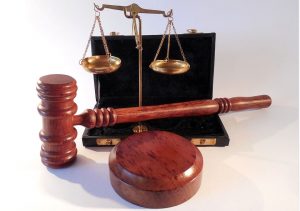
We don’t require any payment to start work on your case. Our patient fall injury attorneys work 100% on contingency. This means you do not have to pay us anything unless we win your case and make a recovery for you.
Typically, once we settle your nursing home fall case, we take 33.3% to 40% of the gross settlement or judgment in attorney’s fees, plus costs expended on the file. There are no upfront charges or costs, the consultation is free, and we only get paid if you get paid.
We do not accept out of pocket payment from clients, because we want to make our law firm accessible to all families, regardless of their ability to pay a lawyer retainer.
What are the Statistics on Falls in Nursing Homes and Hospitals?
Nursing home fall statistics sadly show that many facility falls can be prevented, but are not, due to facility understaffing.
The reality is that falls happen all the time in nursing homes, and as many as 75% of all nursing home residents will fall at some point. Of those who fall, approximately 33% will fall repeatedly. Preventable falls make up as many as 36% of all instances; however, this number is likely severely underreported, since many families do not seek out legal support to hold the facilities accountable. When facilities implement proper fall prevention, the number of patients who fall each month decreases significantly, reducing falls to as little as 3.4% or less. This shows that fall prevention works, and that many nursing homes that do not adequately address fall risk may be directly responsible for the injury or death of a resident.
On average, a nursing home that maintains 100 beds will report anywhere from 100 to 200 falls per year—and these are only the falls that are reported. Loved ones living at home or with their family are four times less likely to die of fall-related injuries than those who rely on a nursing home for their care. According to the CDC, almost 30% of all nursing home falls can be directly attributed to environmental hazards like slippery floors or high doorframes that nursing homes should have prevented. Women are more likely to fall than men, and women are twice as likely to suffer serious injury or death from such a fall. This is likely due to a combination of longer life for women (thus, more opportunities for a fall) and increased incidence of brittle bones.
The prevalence of nursing home falls is unacceptable. Falls are the leading cause of accidental deaths in nursing homes. Despite this, fall risk is ignored by nursing home corporations due to intentional understaffing or general negligence.
Take the Next Step: Speak with a Nursing Home Fall Attorney Today
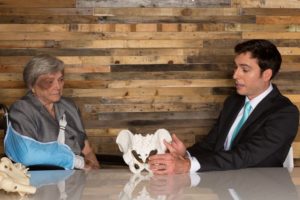
If your mother or father fell in a home and was injured, a nursing home fall attorney can evaluate whether that fall was preventable. If the nursing home is liable for the fall, this means that you are within your rights to bring a lawsuit that seeks not only compensation, but spurs change within the facility for residents going forward.
You may be worried that filing a lawsuit against a nursing home will be expensive. At Senior Justice Law Firm, we understand that you have a lot to think about right now. A consultation with our elder abuse attorneys is free, and we only get paid if we make a recovery for your family. There are no out-of-pocket expenses to you. We believe that this is important in empowering you to take action when a nursing home has wronged your loved one, and we want to support you on your journey to justice.
Speak with a skilled nursing home fall attorney now by live chatting with our law firm, or calling us at 888-375-9998. We look forward to helping you and your family through this difficult chapter.


